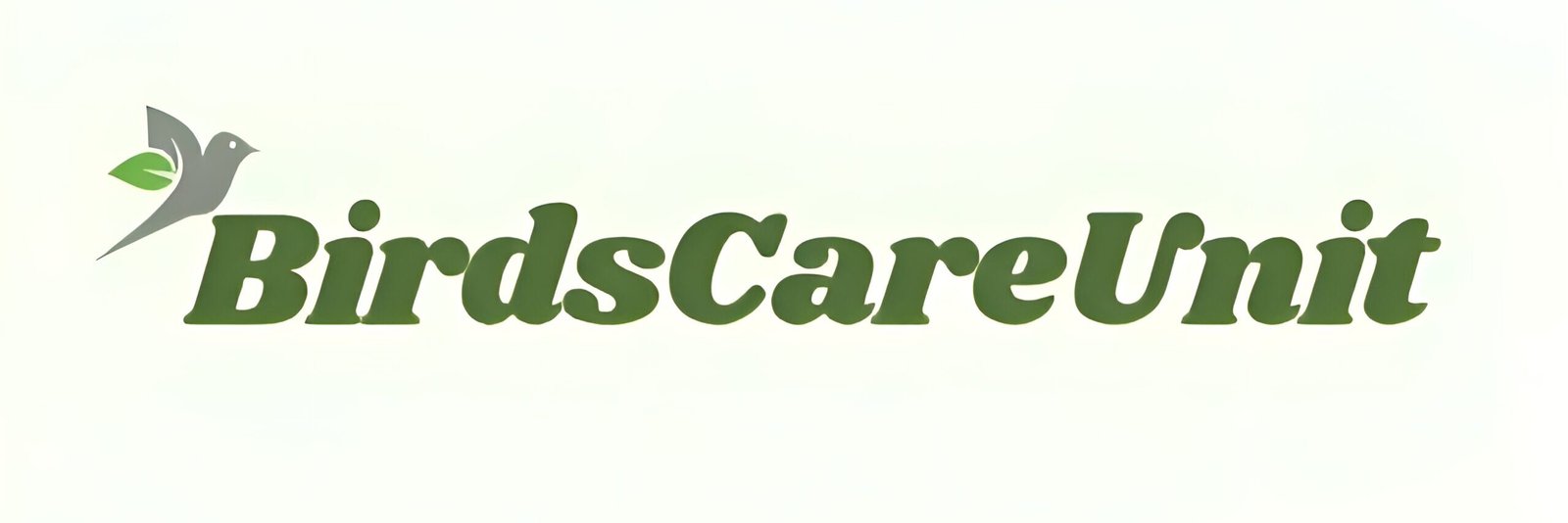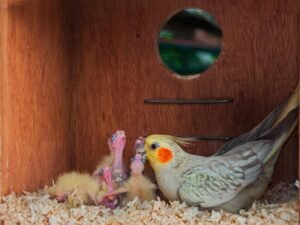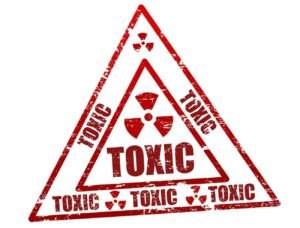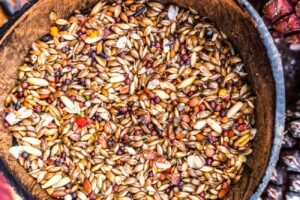What Nutrients do Cockatiel need?
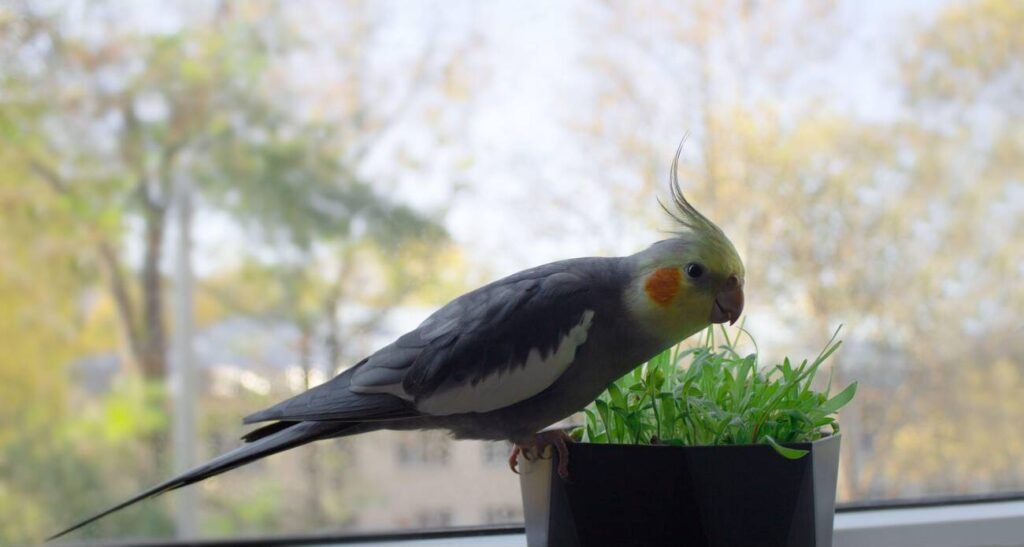
I have over fifty cockatiels and more than ten years of experience breeding pet birds, including cockatiels, parakeets, lovebirds, and Barbary doves. Throughout this time, I’ve faced numerous challenges and gained valuable experience in handling various situations effectively. My expertise in cockatiel nutrition allows me to provide helpful tips for beginners, and I’m confident that following these suggestions can lead to great success in bird care.
Owning a cockatiel requires a strong commitment to keeping your bird healthy, happy, and well-cared for. One of the most crucial aspects of cockatiel care is ensuring a balanced, nutritious diet. Like humans, cockatiels thrive on a variety of foods to maintain good health. This guide will cover everything you need to know about cockatiel nutrition, from the essential components of their diet to strategies for encouraging them to eat fruits and vegetables. By the end, you’ll have a solid understanding of how to help your cockatiel flourish.
1. Introduction to Cockatiel Nutrition
Importance of a Balanced Diet
Providing your cockatiel with a well-balanced diet is essential for their overall well-being. A healthy diet not only ensures your bird gets the necessary vitamins and minerals but also helps prevent common health problems like obesity, malnutrition, and vitamin deficiencies. While many people think that birdseed is all a cockatiel needs, this couldn’t be further from the truth. Just as a diet composed entirely of junk food would be unhealthy for a person, a seed-only diet lacks the essential nutrients for a cockatiel to thrive.
Cockatiel Dietary Needs and Nutrient Breakdown
Cockatiels, like other birds, have specific dietary needs that must be met through a combination of foods. A proper diet consists of pellets, seeds, fresh fruits, vegetables, and some protein and carbohydrates. Here’s a breakdown of what they need:
- Proteins: Necessary for muscle growth and cell repair.
- Fats: While some fats are essential, too much fat (from seeds like sunflower seeds) can lead to obesity.
- Vitamins: Vital for various metabolic processes and immune function.
- Calcium: Essential for bone health, especially in breeding cockatiels.
- Fiber: Helps in digestion and ensures a healthy gut.
Overview of Common Cockatiel Health Problems Related to Diet
A poor diet can lead to several health issues in cockatiels. For example, feeding too many seeds can lead to obesity, while not enough calcium can result in brittle bones or egg binding in females. Other health issues include vitamin deficiencies (such as a lack of vitamin A), which can affect your cockatiel’s respiratory system and immune function.
2. The Foundation of Cockatiel Diets: Pellets and Seeds
Understanding Pellets: A Nutritional Staple
Pellets are often recommended as the foundation of a cockatiel’s diet. They are specifically formulated to provide balanced nutrition and can help prevent the selective eating habits that are common with seed-only diets. When selecting pellets, look for those that are free from artificial colors and preservatives, as these additives can negatively impact your bird’s health.
The Role of Seeds in a Cockatiel’s Diet
Seeds are a natural part of a cockatiel’s diet in the wild, but they should not make up the bulk of their diet in captivity. While seeds provide fats and some essential nutrients, a seed-heavy diet is often too high in fat, leading to obesity and other health problems. A good rule of thumb is to offer seeds in moderation and focus more on providing a variety of other foods.
How to Avoid Overfeeding Seeds and High-Fat Foods
It’s easy to fall into the habit of overfeeding seeds because cockatiels love them. However, high-fat foods like sunflower seeds should only be offered as occasional treats. One way to manage this is by mixing seeds with pellets or gradually replacing some of the seeds in your bird’s diet with healthier options like vegetables and fruits.
3. Incorporating Fresh Vegetables in Your Cockatiel’s Diet
The Importance of Vegetables for Cockatiels
Vegetables are essential for cockatiels because they provide vitamins, minerals, and fiber. Including a variety of vegetables in your bird’s diet will ensure they receive the nutrients that seeds and pellets alone cannot provide. Vegetables are particularly important for providing vitamin A, which is crucial for healthy vision, skin, and immune function.
Best Vegetables for Cockatiels
Here are some of the best vegetables to include in your cockatiel’s diet:
- Dark Leafy Greens: Kale, spinach, and Swiss chard are rich in calcium and vitamin A.
- Broccoli: High in fiber, vitamin C, and calcium.
- Carrots: Packed with beta-carotene, which converts into vitamin A.
- Bell Peppers: Full of antioxidants and vitamins A and C.
Tips for Getting Your Cockatiel to Eat Vegetables
Some cockatiels can be picky eaters, especially when it comes to vegetables. Here are a few tips to encourage your bird to eat its greens:
- Offer Variety: Try offering vegetables in different forms (chopped, sliced, shredded) to see which your bird prefers.
- Serve Warm: Birds often find warm food more appealing, so try lightly steaming the vegetables.
- Lead by Example: Eat vegetables in front of your cockatiel—birds are social eaters and may want to try what you’re eating.
4. Fruits: A Tasty Treat with Nutritional Benefits
Safe Fruits to Feed Your Cockatiel
Fruits are a great way to provide natural sugars, vitamins, and hydration. Some safe fruits for cockatiels include:
- Apples (without seeds)
- Berries (strawberries, blueberries, raspberries)
- Bananas
- Melons (watermelon, cantaloupe)
How to Serve Fruits to Prevent Overconsumption of Sugars
While fruits are nutritious, they should be fed in moderation due to their high sugar content. Offer small portions, and avoid giving fruits that are overly ripe or sugary. Serve fruit alongside vegetables to balance out the diet.
Avoiding Toxic Fruits for Cockatiels
Certain fruits are toxic to cockatiels and should never be offered. These include:
- Avocado: Contains a substance called persin, which is toxic to birds.
- Cherries, Peaches, and Plums: Their pits contain cyanide, which can be lethal if ingested.
5. Supplements for Cockatiels: When and How to Use Them
Calcium and Mineral Blocks
Calcium is particularly important for female cockatiels, especially those that are breeding or laying eggs. A lack of calcium can lead to health problems like egg binding, where the bird struggles to pass an egg, or brittle bones. To prevent calcium deficiencies, cockatiels should have access to calcium-rich sources, such as cuttlebone, which can be placed inside their cage. Additionally, mineral blocks, often made of clay or other naturally occurring minerals, offer essential nutrients that may not always be present in food.
Offering these blocks allows your bird to self-regulate their calcium and mineral intake. However, always ensure the blocks are safe, free from harmful chemicals, and designed for bird consumption.
Vitamins: Natural Sources vs. Supplements
Many cockatiel owners wonder if they should provide additional vitamin supplements. If your bird’s diet primarily consists of quality pellets, fresh vegetables, and fruits, supplements might not be necessary. Most pellets are fortified with essential vitamins, and natural food sources often provide the necessary nutrients. For example:
- Vitamin A: Found in carrots, bell peppers, and dark leafy greens.
- Vitamin C: Present in fruits like berries and broccoli.
- Vitamin D: Cockatiels can synthesize vitamin D with adequate exposure to natural sunlight.
In cases where a bird’s diet lacks variety or specific nutrients, vitamin supplements may be considered. Liquid or powdered supplements can be added to their water or food, but always consult an avian vet before introducing supplements to ensure they’re necessary and safe.
Signs Your Cockatiel May Need a Supplement
Certain signs may indicate that your cockatiel is not getting enough vitamins or minerals in their diet. Common symptoms include:
- Dull or flaky feathers
- Weakness or lethargy
- Beak and nail overgrowth
- Poor appetite or weight loss
- Difficulty in laying eggs (egg binding)
If you notice any of these symptoms, consult an avian veterinarian for a proper diagnosis and recommendation on supplements or dietary changes.
6. Proteins, Carbohydrates, and Grains: Expanding the Cockatiel’s Diet
Protein Sources for Cockatiels
Although seeds contain some protein, cockatiels also need additional sources to support muscle growth, energy levels, and overall health. Cockatiels can enjoy various types of protein-rich foods, including:
- Boiled eggs: A small amount of mashed boiled egg can be a great protein source. Ensure it is fully cooked and given in moderation.
- Cooked legumes: Beans and lentils are a plant-based protein that cockatiels typically enjoy. Make sure they are fully cooked and cooled before serving.
- Insects: While not common in many diets, some cockatiels may enjoy dried or live mealworms, providing a high-protein snack.
Cooked Grains and Carbohydrates to Include in Meals
Grains and carbohydrates offer energy and fiber, making them a useful addition to a cockatiel’s diet. Opt for whole grains and cook them thoroughly. Some suitable options include:
- Brown rice: A great source of carbohydrates, fiber, and a small amount of protein.
- Quinoa: Packed with protein and other nutrients, quinoa is a popular choice for birds.
- Oats: Both rolled and steel-cut oats can be offered, but they should be cooked and served without added sugar or salt.
Grains should be offered in moderation, as they are more calorie-dense. It’s essential to balance them with fresh vegetables and fruits.
How Often to Feed Protein and Carbohydrates
Protein-rich foods and grains should be offered 2–3 times per week. Overfeeding can lead to weight gain or imbalanced nutrition, so aim for small, controlled portions as part of a varied diet. Protein is especially important for breeding cockatiels or those molting, as they have higher nutritional demands during these times.
7. Treats and Snacks: What’s Safe and What’s Not
Commercial Cockatiel Treats: Pros and Cons
There are numerous commercial treats available for cockatiels, such as seed sticks, honey treats, and flavored biscuits. While these are readily available and often enjoyed by cockatiels, they can sometimes be high in sugar, artificial ingredients, and unhealthy fats. It’s okay to offer these treats occasionally, but they should not become a regular part of your bird’s diet.
When choosing commercial treats, always check the ingredients list for unnecessary additives. Opt for those that are natural, organic, and minimally processed.
Homemade Treat Ideas
Homemade treats can be a healthier and more controlled option. Some ideas include:
- Birdie muffins: You can bake small muffins using ingredients like whole wheat flour, mashed vegetables, and eggs. Avoid adding sugar or salt.
- Fruit popsicles: Blend fresh fruit and freeze it into ice cube trays for a refreshing treat during hot weather.
- Nut butter spread: A tiny amount of unsalted, natural peanut butter spread on a slice of apple or a cracker can be an excellent source of protein and fats.
These homemade options allow you to control the ingredients and avoid additives or excess sugars.
Foods to Avoid: Toxic Foods and Ingredients
Certain foods are toxic to cockatiels and should never be offered. Always keep these foods out of reach of your bird:
- Avocado: Contains persin, which can cause respiratory distress and heart failure.
- Chocolate: Theobromine and caffeine are toxic to birds, potentially causing seizures or death.
- Alcohol: Even small amounts can be lethal.
- Caffeine: Found in coffee, tea, and some sodas, caffeine can cause hyperactivity and heart issues in birds.
- Onions and garlic: These can cause anemia and gastrointestinal problems.
- Salty or sugary foods: Cockatiels do not process salt or sugar well and should avoid processed foods with high amounts of either.
Always double-check whether new foods are safe before offering them to your cockatiel.
8. Ensuring Proper Hydration and Water Quality
How Much Water Does a Cockatiel Need?
Cockatiels, like all animals, need a constant supply of fresh water to stay hydrated and healthy. They may drink more during warmer weather or after eating dry foods like seeds and grains. On average, a cockatiel will drink about 1-2 teaspoons of water per day, but this can vary depending on their diet and activity levels.
Common Water Sources and Their Impact on Health
It’s essential to ensure the water you provide is clean and free from harmful contaminants. Here are some common water sources and their pros and cons:
- Tap water: If your tap water is safe for human consumption, it should generally be fine for cockatiels. However, water with high chlorine levels or other contaminants should be avoided.
- Filtered water: Using a water filter can help remove impurities and ensure your cockatiel is drinking clean, safe water.
- Bottled water: While not necessary, bottled water is an option if your local tap water quality is poor.
Regularly change your cockatiel’s water and clean their water dish to prevent the growth of bacteria or algae.
Adding Electrolytes and Minerals to Water
Sometimes, cockatiels may need extra support for hydration, particularly in hot weather or during illness. You can purchase electrolyte solutions specifically designed for birds, which help replace lost minerals and support recovery. Always follow the dosage instructions and consult with an avian vet before adding anything to their water.
9. Behavioral and Psychological Factors in Cockatiel Eating Habits
How Cockatiels’ Social Behavior Impacts Their Diet
Cockatiels are social creatures, and their eating habits are often influenced by their environment. They may be more willing to try new foods when they see other birds or even humans eating them. Eating alongside your cockatiel, or pretending to eat their food, can encourage them to explore new tastes.
Using Food as Enrichment for Mental Stimulation
Incorporating food into enrichment activities can stimulate your cockatiel’s mind and make mealtime more exciting. Here are a few ideas:
- Foraging toys: Hide small pieces of food inside foraging toys to encourage natural foraging behavior.
- Hanging vegetables: Hang leafy greens or fruit pieces in different parts of the cage for your bird to find.
- Puzzle feeders: Use puzzle feeders to make your cockatiel work for their food, which keeps them mentally active and entertained.
Training Your Cockatiel to Eat a Variety of Foods
Cockatiels can be picky eaters, but with patience and consistency, you can train them to accept a more varied diet. Here are a few strategies:
- Gradual introduction: Mix new foods with familiar ones, gradually increasing the amount of the new food.
- Positive reinforcement: Reward your cockatiel with praise or a favorite treat when they try a new food.
- Consistency: Offer new foods regularly, even if they don’t show interest right away. It may take several attempts before they decide to try something new.
10. Preventing Diet-Related Health Issues
Obesity in Cockatiels: Causes and Prevention
Obesity is a significant concern for cockatiels, particularly when their diet is overly reliant on high-fat seeds. Excess weight can lead to a variety of health problems, including fatty liver disease, cardiovascular issues, and joint problems. To prevent obesity:
- Limit seeds: Offer seeds in moderation and focus on a balanced diet with a variety of foods, including pellets, vegetables, and fruits.
- Encourage activity: Ensure your cockatiel has ample space to fly and exercise. Provide toys and climbing structures to promote physical activity.
- Monitor weight: Regularly check your cockatiel’s weight and adjust their diet and exercise routine if necessary.
Vitamin Deficiencies: Symptoms and Solutions
Vitamin deficiencies can manifest in various ways, affecting your cockatiel’s health and appearance. Common deficiencies and their symptoms include:
- Vitamin A: Essential for healthy vision and immune function. Symptoms of deficiency include feather plucking, respiratory issues, and poor skin condition. Offer foods rich in vitamin A, like carrots and dark leafy greens.
- Vitamin D: Important for calcium absorption. Deficiency can lead to bone problems and egg binding. Ensure your cockatiel has access to natural sunlight or a UVB light source if indoors.
- Vitamin C: Vital for the immune system and overall health. Symptoms of deficiency may include lethargy and poor feather condition. Include vitamin C-rich fruits and vegetables in their diet.
If you suspect a vitamin deficiency, consult with an avian vet for a thorough examination and specific dietary recommendations.
Digestive Health and Avoiding Gastrointestinal Problems
A well-balanced diet supports healthy digestion in cockatiels. To maintain digestive health:
- Provide fiber: Ensure your cockatiel has access to high-fiber foods like vegetables and pellets. Fiber aids digestion and prevents issues like constipation.
- Avoid sudden diet changes: Introduce new foods gradually to prevent digestive upset.
- Monitor droppings: Regularly check your cockatiel’s droppings for changes in color, consistency, or frequency, which can indicate digestive issues.
If you notice signs of gastrointestinal problems, such as diarrhea or changes in droppings, seek advice from an avian veterinarian.
11. Conclusion: The Key to a Long, Healthy Life for Your Cockatiel
Maintaining a well-balanced diet is crucial for the health and happiness of your cockatiel. By understanding and providing the right mix of pellets, seeds, vegetables, fruits, and proteins, you can help ensure that your feathered friend lives a long, healthy life.
Key takeaways include:
- Variety and balance: Offer a mix of high-quality pellets, seeds, fresh vegetables, fruits, and occasional protein sources to provide complete nutrition.
- Moderation and control: Avoid overfeeding seeds and treats, and ensure your cockatiel’s diet is balanced and varied.
- Monitor health: Regularly check your cockatiel’s weight, droppings, and overall health. Seek veterinary advice if you notice any changes or symptoms of nutritional deficiencies.
- Enrichment and stimulation: Use food as part of enrichment activities to keep your cockatiel mentally stimulated and engaged.
By following these guidelines and paying close attention to your cockatiel’s dietary needs, you’ll be well on your way to ensuring a happy and healthy life for your feathered companion.
